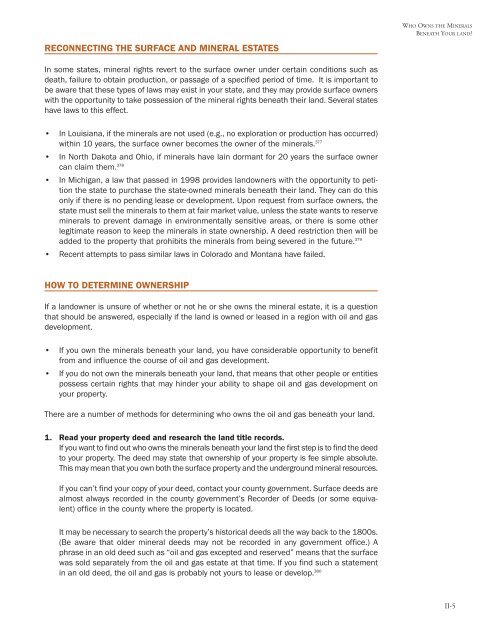Oil and Gas at Your Door? (2005 Edition) - Earthworks
Oil and Gas at Your Door? (2005 Edition) - Earthworks
Oil and Gas at Your Door? (2005 Edition) - Earthworks
You also want an ePaper? Increase the reach of your titles
YUMPU automatically turns print PDFs into web optimized ePapers that Google loves.
WHO OWNS THE MINERALS<br />
BENEATH YOUR LAND?<br />
RECONNECTING THE SURFACE AND MINERAL ESTATES<br />
In some st<strong>at</strong>es, mineral rights revert to the surface owner under certain conditions such as<br />
de<strong>at</strong>h, failure to obtain production, or passage of a specified period of time. It is important to<br />
be aware th<strong>at</strong> these types of laws may exist in your st<strong>at</strong>e, <strong>and</strong> they may provide surface owners<br />
with the opportunity to take possession of the mineral rights bene<strong>at</strong>h their l<strong>and</strong>. Several st<strong>at</strong>es<br />
have laws to this effect.<br />
• In Louisiana, if the minerals are not used (e.g., no explor<strong>at</strong>ion or production has occurred)<br />
within 10 years, the surface owner becomes the owner of the minerals. 377<br />
• In North Dakota <strong>and</strong> Ohio, if minerals have lain dormant for 20 years the surface owner<br />
can claim them. 378<br />
• In Michigan, a law th<strong>at</strong> passed in 1998 provides l<strong>and</strong>owners with the opportunity to petition<br />
the st<strong>at</strong>e to purchase the st<strong>at</strong>e-owned minerals bene<strong>at</strong>h their l<strong>and</strong>. They can do this<br />
only if there is no pending lease or development. Upon request from surface owners, the<br />
st<strong>at</strong>e must sell the minerals to them <strong>at</strong> fair market value, unless the st<strong>at</strong>e wants to reserve<br />
minerals to prevent damage in environmentally sensitive areas, or there is some other<br />
legitim<strong>at</strong>e reason to keep the minerals in st<strong>at</strong>e ownership. A deed restriction then will be<br />
added to the property th<strong>at</strong> prohibits the minerals from being severed in the future. 379<br />
• Recent <strong>at</strong>tempts to pass similar laws in Colorado <strong>and</strong> Montana have failed.<br />
HOW TO DETERMINE OWNERSHIP<br />
If a l<strong>and</strong>owner is unsure of whether or not he or she owns the mineral est<strong>at</strong>e, it is a question<br />
th<strong>at</strong> should be answered, especially if the l<strong>and</strong> is owned or leased in a region with oil <strong>and</strong> gas<br />
development.<br />
• If you own the minerals bene<strong>at</strong>h your l<strong>and</strong>, you have considerable opportunity to benefit<br />
from <strong>and</strong> influence the course of oil <strong>and</strong> gas development.<br />
• If you do not own the minerals bene<strong>at</strong>h your l<strong>and</strong>, th<strong>at</strong> means th<strong>at</strong> other people or entities<br />
possess certain rights th<strong>at</strong> may hinder your ability to shape oil <strong>and</strong> gas development on<br />
your property.<br />
There are a number of methods for determining who owns the oil <strong>and</strong> gas bene<strong>at</strong>h your l<strong>and</strong>.<br />
1. Read your property deed <strong>and</strong> research the l<strong>and</strong> title records.<br />
If you want to find out who owns the minerals bene<strong>at</strong>h your l<strong>and</strong> the first step is to find the deed<br />
to your property. The deed may st<strong>at</strong>e th<strong>at</strong> ownership of your property is fee simple absolute.<br />
This may mean th<strong>at</strong> you own both the surface property <strong>and</strong> the underground mineral resources.<br />
If you can’t find your copy of your deed, contact your county government. Surface deeds are<br />
almost always recorded in the county government’s Recorder of Deeds (or some equivalent)<br />
office in the county where the property is loc<strong>at</strong>ed.<br />
It may be necessary to search the property’s historical deeds all the way back to the 1800s.<br />
(Be aware th<strong>at</strong> older mineral deeds may not be recorded in any government office.) A<br />
phrase in an old deed such as “oil <strong>and</strong> gas excepted <strong>and</strong> reserved” means th<strong>at</strong> the surface<br />
was sold separ<strong>at</strong>ely from the oil <strong>and</strong> gas est<strong>at</strong>e <strong>at</strong> th<strong>at</strong> time. If you find such a st<strong>at</strong>ement<br />
in an old deed, the oil <strong>and</strong> gas is probably not yours to lease or develop. 380<br />
II-5




